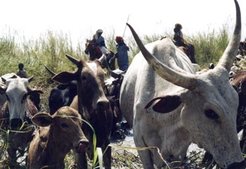Competing Practices in Conflict?
How nomadic Fulbe (b)order their world - Summary

All studies about natural resource management in West Africa agree on the fact that there is an explosive demographic growth, resulting in the transformation of large areas of former commonly managed pastoral lands into individually owned agricultural fields. Moreover, draughts, bad harvests, famines and massive losses of livestock caused by reductions in average rainfall have contributed to an increasing competition over resources. There is an important cross-disciplinary scientific debate about the consequences of these developments, mainly if they will inevitably lead to large scale conflicts over resources. How does this change the relations between “traditionally” groups practicing agriculture and those practicing transhumant pastoralism? In this PhD thesis I want to contribute to this debate.
The research questions how social order is brought about by actors carrying out different practices in a shared resource without strong central governance. For this aim, data collection was done in the Far North Province of Cameroon among nomadic Fulbe cattle herders and the different sedentary groups of farmers, pastoralists, fishermen and authorities with whom they interact during their seasonal mobility. The research has a comparative approach and studies historical cases of conflicts over resources in different ecological and sociopolitical settings to understand which (combination of) variables play a role in conflicts over resources and their management.
The theoretical focus of analysis is on the orchestration of the divergent spatial and temporal organizations of the different practices of pastoralism, fishing, herding, thieving and governance. The main question is how different perceptions of past, future and space of individuals and groups involved in these practices are harmonized and thus bring about social order and the creation of co-existing collectives.

The argument of this PhD is that large scale conflicts between resource users are not inevitably rooted in scarcity. Small scale conflicts are however an inherent part of the orchestration of competing practices by their members. To understand however how small scale conflicts develop into large ones, an understanding of the intermingling of motivations and goals involved in practices is needed. These are rooted in divergent conceptions of the past and the desired future by the participants of a practice. If and how actors belonging to different practices manage to harmonize these spatially should be the focus of research in order to understand if scarcity will lead to large scale conflicts in practice.

